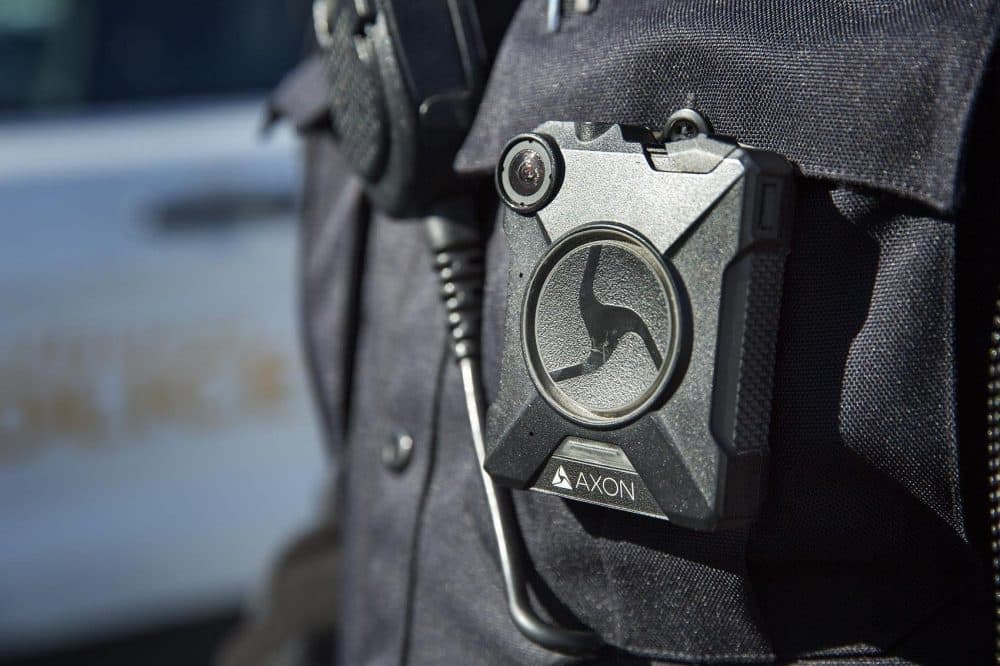Advertisement
Boston Announces 'Phased-In Approach' To Full Police Body Cam Expansion

Boston will expand its police body camera pilot across the city “through a phased-in approach,” Mayor Marty Walsh announced Thursday, as the final report on the pilot program was released.
Over the $500,000, one-year pilot, 100 randomly selected officers in several police districts wore one of two types of body camera in the course of their shifts.
The pilot concluded last September, at which point researchers at Northeastern University began reviewing the data from the involved officers.
The cameras “generate small but meaningful benefits to the civility of police-citizen civilian encounters," Anthony Braga, a Northeastern researcher, said in a statement. "The study finds that officers wearing cameras received fewer citizen complaints and generated fewer use of force reports relative to officers who did not wear cameras. The presence of the cameras seem to de-escalate the potential for confrontations between police and citizens."
About 38,200 videos, covering more than 4,600 hours of police work, were collected during the pilot. One of the major cost components of a citywide rollout is the management and storage of video.
The final report delves into people's perceptions around the cameras, including officers, advocacy groups and members of the public. It made recommendations on implementing and improving the cameras usage, such as a notification system for the public, a review process to ensure that videos exist where appropriate and documentation exists for encounters when video was not captured.
In statements, the mayor and both outgoing Boston Police Commissioner William Evans and incoming Commissioner William Gross said the value of the body cameras displayed in the study makes a compelling case for expanding the program.
"This study shows the potential value that body cameras can have as part of our overall strategy for strengthening ties between law enforcement and the residents they serve,” Walsh said. “I am proud that we will be moving forward on this, and look forward to seeing how this program will further support the transformative progress we have made in community policing."
Already included in this year’s city budget is a $2 million investment for the adoption of police body cameras, based on a preliminary analysis in January. It will cover start-up costs and the purchase of up to 400 cameras — there are about 2,200 officers in the department. The mayor’s office estimates a three-year cost of about $8.5 million at first and annual recurring costs after fiscal year 2021 at about $3.3 million.
Police unions caused a tangle in implementing the pilot, and the city is now “engaging in conversations with the police unions,” the mayor’s office announcement said.
Officials evolved on early trepidation around the cameras to a full-throated expression of support this year.
"I'm proud of our officers for taking this pilot seriously and for continuing the hard work they do every day," Evans said. "The results from this study show there is positive impact in the use of the body cameras. While the numbers in Boston are low, there is always room for improvement. If using technology like body cameras can help further improve the way we police, I'm happy to see the City's commitment to full implementation."
Gross, who was one of the command staff fitted with a camera, concurred.
"The Body Worn Camera Pilot process and study have been very important in understanding firsthand what members of the community believe will help the city move forward and how technology can play a role," he said. "I look forward to the opportunity to lead our officers in adding this program to our community policing strategy and strengthening relationships across this city."
Throughout the pilot, prosecutors and attorneys alike have touted the videos as invaluable tools. One of the study recommendations is to create a formal process to transfer videos from police to prosecutors, and from prosecutors to defense attorneys.
Citizen complaints and use of force complaints had been on a decline before the pilot program, officials note. In the pilot program, officers with cameras received approximately one fewer complaint per month than their counterparts and slightly less than one use of force report per month.
City Council President Andrea Campbell, who vice-chairs the council’s public safety and criminal justice committee, thanked the police department and Northeastern for reviewing the pilot and the mayor’s office for allocating funds for a full rollout.
She told the Reporter that body cameras are “a technology that not only serves our officers but also the community, and has real potential to build more trust between the two,” adding, “I look forward to working with BPD to ensure the policy reflects community input, and that all units especially those with the highest number of complaints are considered for body camera outfitting first.”
This story comes from the Dorchester Reporter. The Reporter and WBUR have a partnership in which the two news organizations share resources and collaborate on stories.